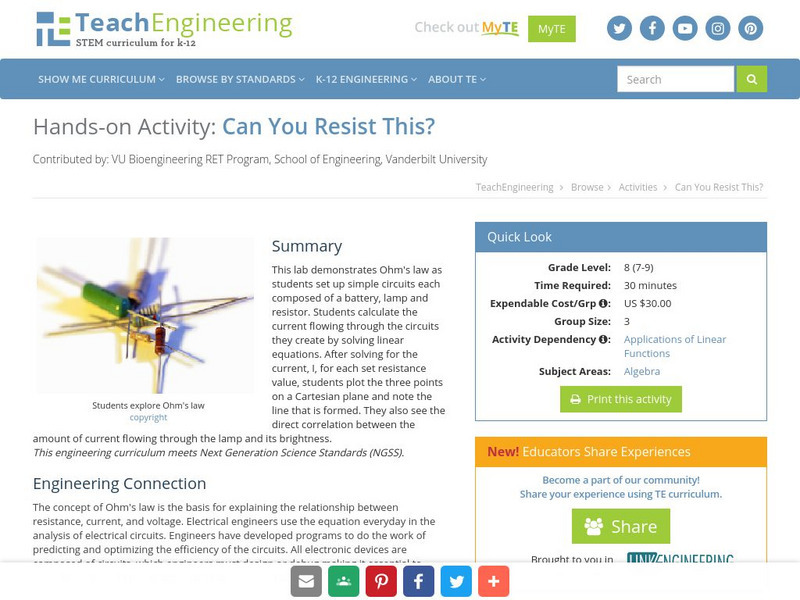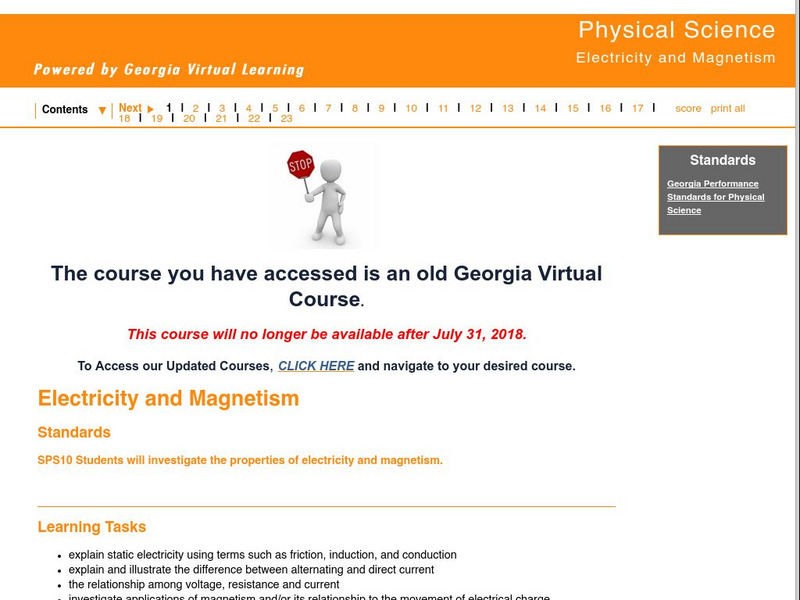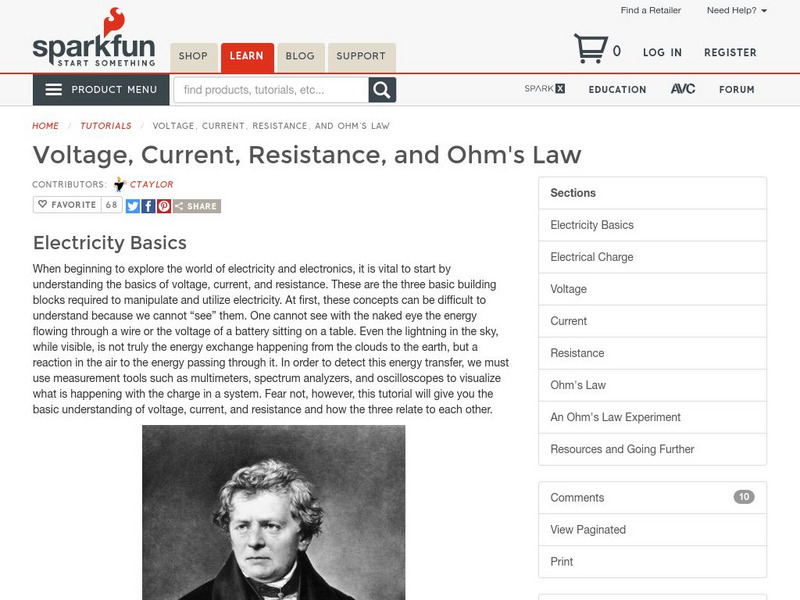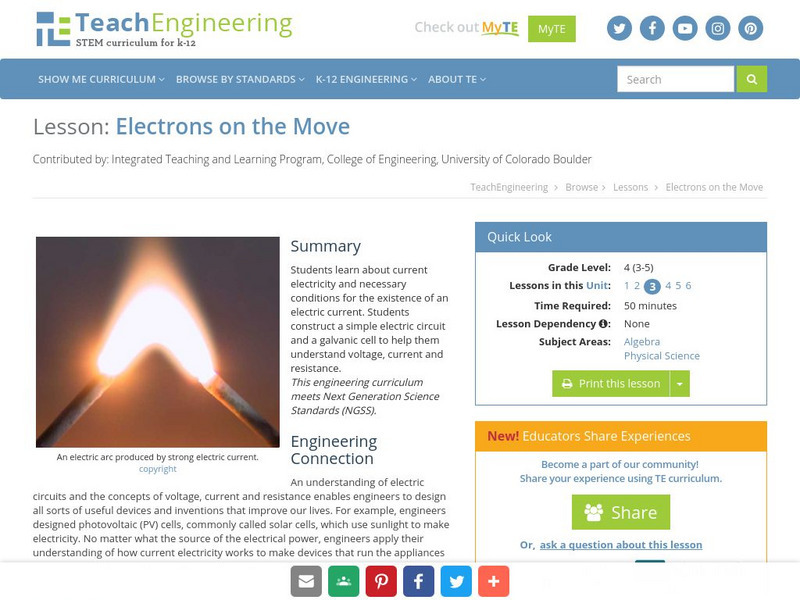Hi, what do you want to do?
Concord Consortium
Concord Consortium: Dc Circuits: Series Resistances (Sparks 1)
This interactive simulation guides you through the wiring of the standard breadboard and presents you with questions regarding voltage drops and currents in series resistive circuits.
Georgia Department of Education
Ga Virtual Learning: Steady State Direct Current With Batteries & Resistors Only
In this interactive tutorial, students will analyze series circuits and parallel circuits along with complex circuits composed of elements in series and parallel. Learners will use schematics to help them understand these circuits....
TeachEngineering
Teach Engineering: Can You Resist This?
This lab demonstrates Ohm's law as students set up simple circuits each composed of a battery, lamp and resistor. Students calculate the current flowing through the circuits they create by solving linear equations. After solving for the...
CK-12 Foundation
Ck 12: Physics Simulation: Power Lines
[Free Registration/Login Required] Learn about the relationship between electric potential, current, and resistance in the context of high-voltage AC power lines using this interactive simulation. A PDF worksheet and a video tutorial are...
Georgia Department of Education
Ga Virtual Learning: Physical Science: Electricity and Magnetism
Students learn about static electricity using terms such as friction, induction, and conduction. They also explain and illustrate the difference between alternating and direct current, and understand the relationship among voltage,...
Other
Spark Fun: Voltage, Current, Resistance, and Ohm's Law
Whether you are looking for an introduction to resistors, volt, and current, or just looking for a reference, this article provides great information for all ability levels. Great videos, diagrams, images, and links to more information...
Concord Consortium
Concord Consortium: Dc Circuits: Series Parallel Resistances (Sparks 3)
Answer questions regarding voltage drops across resistors and currents through them in such circuits. Practice calculating the effective resistances of a set of resistances in series and parallel.
Concord Consortium
Concord Consortium: Dc Circuits: Parallel Resistances (Sparks 2)
Explore circuits with resistors in parallel and answer questions regarding voltage drops across resistors and currents through them in such circuits.
Concord Consortium
Concord Consortium: Calculating Voltage in Series Parallel Circuits
Use the series and parallel resistance formulas to determine the total resistances of the parts. Then, use Ohm's Law to calculate the voltage drops across each part.
Other
Easyphysics: Chapter 13 Current Electricity
Learners investigate current electricity. Some topics examined are voltage law, Ohm?s law, and electric resistance. The resource includes example problems with solutions and a chapter quiz.
Concord Consortium
Concord Consortium: Measuring Voltage in Series Parallel Circuits
Measuring voltage drops across resistances in series-parallel circuits requires an understanding of both series and parallel circuit behavior. Learn more with this tutorial.
Concord Consortium
Concord Consortium: Measuring Voltage in Series Circuits
Measuring the voltage in a circuit is like measuring the drop in pressure across two points. Learn more with this tutorial.
Concord Consortium
Concord Consortium: Measuring Voltage on a Breadboard
Find out how measuring voltage in a circuit is like measuring the pressure in a water pipe.
Physics Aviary
Physics Aviary: Practice Problems: Internal Resistance of Battery Problem
Determine the internal resistance of a battery based on the graph of terminal voltage vs. current. Also find the maximum current and the electrochemical potential.
Science and Mathematics Initiative for Learning Enhancement (SMILE)
Smile: Electron Current Flow
A teacher lesson plan which could be easily converted into an idea for a student project or presentation. This page describes an activity in which the water-electricity analogy is used to investigate the relationship between current,...
Physics Aviary
Physics Aviary: Internal Resistance of Battery
This lab is designed to have students look at the change in the terminal voltage of a battery that occurs as you draw more current from the battery.
Concord Consortium
Concord Consortium: Calculating Current in Series Parallel Circuits
Use resistance formulas to determine the total resistances of the series and parallel parts. Then, use Ohm's Law to calculate the voltage drops across and currents through each part.
Georgia State University
Georgia State University: Hyper Physics: Ohm's Law and Current Law
At this site from Georgia State University Ohm's law is stated in words and using equations. A JavaScript form allows for multiple practice problems with instant feedback and reinforcement. Kirchoff's current law is stated and...
Physics Aviary
Physics Aviary: Practice Problems: Current in a Wire Problem
Determine the resistance of a wire based on its composition and its physical dimensions. Find the current that would flow through the wire when the wire is connected to a certain voltage.
Physics Aviary
Physics Aviary: Practice Problems: Finding Battery Voltage Very Hard
Determine the voltage of the battery based on the colors of the resistors and the current in a combination circuit.
CK-12 Foundation
Ck 12: Fourth Grade Science: Physical Science: Electric Current
[Free Registration/Login may be required to access all resource tools.] Defines electric current and relates electric current to different materials (insulators and conductors).
Khan Academy
Khan Academy: Electric Potential Difference and Ohm's Law Review
Review the key terms, equations, and skills related to Ohm's law, including how electric potential difference, current, and resistance are related.
Ducksters
Ducksters: Physics for Kids: Electricity Glossary and Terms
Kids learn about electricity glossary and terms in the science of physics. Words and definitions you need to know such as current, voltage, resistance, and more.
TeachEngineering
Teach Engineering: Electrons on the Move
Students learn about current electricity and necessary conditions for the existence of an electric current. Students construct a simple electric circuit and a galvanic cell to help them understand voltage, current and resistance.





















